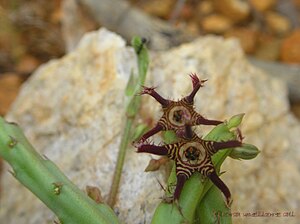Note: This is a project under development. The articles on this wiki are just being initiated and broadly incomplete. You can Help creating new pages.
Difference between revisions of "Caralluma Adsendens"
| Line 1: | Line 1: | ||
{{stub}} | {{stub}} | ||
[[File:Caralluma attenuata Wt..jpg|thumb|right|''Linaria vulgaris'']] | [[File:Caralluma attenuata Wt..jpg|thumb|right|''Linaria vulgaris'']] | ||
| − | + | '''Caralluma adscendens''' is a small shrub. It grows upto 30 - 60cm tall in height. The stem bases are up to 2cm in diameter. The plant is harvested from the wild as a local source of food and medicine. The plant is sometimes grown as an ornamental. | |
==Uses== | ==Uses== | ||
| − | {{Uses|Ear Infections}}, {{Uses|Cough}}, {{Uses|Epilepsy}}. | + | {{Uses|Ear Infections}}, {{Uses|Cough}}, {{Uses|Epilepsy}}, {{Uses|Ear Infections}}, {{Uses|Scorpion bite}}, {{Uses|Snake bite}}, {{Uses|Cardiac problems}}, {{Uses|Epilepsy}}. |
===Food=== | ===Food=== | ||
| Line 36: | Line 36: | ||
==Habit== | ==Habit== | ||
| − | {{Habit|}} | + | {{Habit|Shrub}} |
==Identification== | ==Identification== | ||
| Line 55: | Line 55: | ||
==Mode of Propagation== | ==Mode of Propagation== | ||
| − | {{Propagation|}} | + | {{Propagation|Seeds}}, {{Propagation|Cuttings}}. |
| − | ==Cultivation== | + | ==Cultivation Details== |
| − | Caralluma Adsendens is available through June to September.<ref name="How to plant/cultivate"/> | + | Caralluma Adsendens is available through June to September. A plant of lowland areas in the drier tropics where it is found at elevations up to 1,000 metres. It tolerates high temperatures and an annual rainfall as low as 400mm.<ref name="How to plant/cultivate"/> |
==Commonly seen growing in areas== | ==Commonly seen growing in areas== | ||
| − | {{Commonly seen|}}, {{Commonly seen| | + | {{Commonly seen|Gravelly soils and rocky hills}}, {{Commonly seen|At elevations from sea-level to 1,000 metres}}. |
==Photo Gallery== | ==Photo Gallery== | ||
Revision as of 20:47, 14 October 2021
Caralluma adscendens is a small shrub. It grows upto 30 - 60cm tall in height. The stem bases are up to 2cm in diameter. The plant is harvested from the wild as a local source of food and medicine. The plant is sometimes grown as an ornamental.
Contents
- 1 Uses
- 2 Parts Used
- 3 Chemical Composition
- 4 Common names
- 5 Properties
- 6 Habit
- 7 Identification
- 8 List of Ayurvedic medicine in which the herb is used
- 9 Where to get the saplings
- 10 Mode of Propagation
- 11 Cultivation Details
- 12 Commonly seen growing in areas
- 13 Photo Gallery
- 14 References
- 15 External Links
Uses
Ear Infections, Cough, Epilepsy, Ear Infections, Scorpion bite, Snake bite, Cardiac problems, Epilepsy.
Food
Caralluma Adsendens can be used in food. Succulent shoots are cooked as vegetable.
Parts Used
Chemical Composition
Common names
| Language | Common name |
|---|---|
| Kannada | Caralluma |
| Hindi | |
| Malayalam | |
| Tamil | |
| Telugu | |
| Marathi | |
| Gujarathi | |
| Punjabi | |
| Kashmiri | |
| Sanskrit | |
| English |
Properties
Reference: Dravya - Substance, Rasa - Taste, Guna - Qualities, Veerya - Potency, Vipaka - Post-digesion effect, Karma - Pharmacological activity, Prabhava - Therepeutics.
Dravya
Rasa
Guna
Veerya
Vipaka
Karma
Prabhava
Nutritional components
Caralluma Adsendens contains the Following nutritional components like Vitamin-C, Niacin; Calcium, Iron, Magnesium, Manganese, Phosphorus, Potassium, Sodium[2]
Habit
Identification
Leaf
| Kind | Shape | Feature |
|---|---|---|
Flower
| Type | Size | Color and composition | Stamen | More information |
|---|---|---|---|---|
| {{{5}}} |
Fruit
| Type | Size | Mass | Appearance | Seeds | More information |
|---|---|---|---|---|---|
| Solitary |
Other features
List of Ayurvedic medicine in which the herb is used
Where to get the saplings
Mode of Propagation
Cultivation Details
Caralluma Adsendens is available through June to September. A plant of lowland areas in the drier tropics where it is found at elevations up to 1,000 metres. It tolerates high temperatures and an annual rainfall as low as 400mm.[4]
Commonly seen growing in areas
Gravelly soils and rocky hills, At elevations from sea-level to 1,000 metres.
Photo Gallery
References
External Links
- [ ]
- [ ]
- [ ]
- Pages that are stubs
- Ayurvedic Herbs known to be helpful to treat Ear Infections
- Ayurvedic Herbs known to be helpful to treat Cough
- Ayurvedic Herbs known to be helpful to treat Epilepsy
- Ayurvedic Herbs known to be helpful to treat Scorpion bite
- Ayurvedic Herbs known to be helpful to treat Snake bite
- Ayurvedic Herbs known to be helpful to treat Cardiac problems
- Herbs with Shoots used in medicine
- Herbs with common name in Kannada
- Habit - Shrub
- Index of Plants which can be propagated by Seeds
- Index of Plants which can be propagated by Cuttings
- Herbs that are commonly seen in the region of Gravelly soils and rocky hills
- Herbs that are commonly seen in the region of At elevations from sea-level to 1,000 metres
- Herbs


